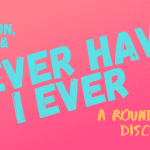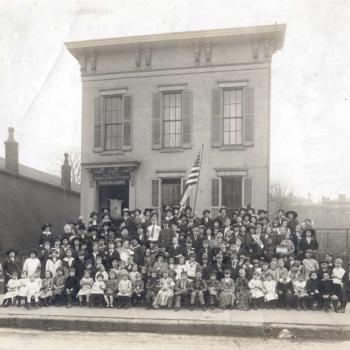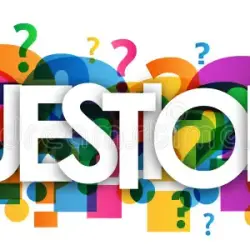This week most major Texas cities implemented ordinances requiring masking in public. My germaphobic Texan heart is happy. Last week, by contrast, huge swaths of my fellow Texans remained unmasked in indoor public spaces. Yet COVID-19 case numbers, percent positive test results, and hospitalizations were all skyrocketing across my beloved state (they still are). Reflecting on this phenomenon—and my emotional responses to it—led me to a deeper understanding of the relationship between individual and systemic sin — and my own role in both.
I could not understand my neighbors’ behavior: masking, when combined with social distancing, saves both lives and livelihoods. It protects the health of individuals and allows commerce to continue by preventing the need for another shutdown. (I may be a germaphobe, but I also have friends and family who own small businesses. I understand how important protecting them is too.)
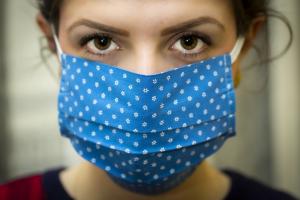
Key to understanding the Center for Disease Control (CDC)’s advice to wear masks in public is that masks protect the wearer some, but they protect people near the wearer a lot. “My mask protects you; your mask protects me.” COVID-19 is so dangerous because it spreads easily a few days before someone develops symptoms. Hence, none of us know whether we are spreading it. So not wearing a mask is not a personal health choice: those who make this choice endanger others more than they endanger themselves.
But here’s the weird thing: I know by experience that so many of my fellow Texans actually care about their neighbors. So why weren’t they masking? It was maddening! And it was affecting me personally. Right when I had been planning to return to going out more and patronizing indoor establishments (masked and distanced), the case numbers in my town rose exponentially, while friends reported that hardly anyone in grocery stores wore a mask. I felt trapped, like I couldn’t wisely go out much because my fellow citizens were acting unwisely en masse.
So I asked myself why a bunch of people who actually do care about others would collectively act against the public good. I read articles and talked to friends. Several factors seem to be at play:
(1) Some people assume that as long as they remain six feet apart, their risk of getting or transmitting the virus indoors is negligible. Hence, masks would be unnecessary. Unfortunately, the airflow in many establishments or the inability to maintain distancing at all times means this is not consistently the case. But you have to admit, this was the initial message at the start of the pandemic before we understood the virus’s behavior more. This assumption therefore results from a failure of government and media to educate the public well.
(2) Some people assume that government or scientific experts cannot be trusted because their motivations are not the public good, but rather political gain. Sometimes messaging has been conflicted because consensus on new findings was being formed. But messaging also became politicized. Some citizens are therefore understandably skeptical. For example, the CDC recommends mask use in public, but President Trump does not model this behavior. National health authorities who cautioned against churches reopening endorsed Black Lives Matter protests. Different states and localities have enacted different policies. Some of these differences are natural, the result of different conditions on the ground. But in some circles masking came to signal left-leaning politics and refusing to mask came to signal right-leaning politics. This is tragic. Surely a measure that protects both lives and livelihoods could gain bipartisan support. But it is very difficult for any measure in our culture to avoid partisanship. This assumption therefore results from a failure of our entire polarized political culture to practice civil dialogue in good faith.
(If you, like me, instinctively blame political polarization on “those people” without reflecting on the contributions made by your own tribe, then you, like me, are caught in the net of this particular sin. You, like me, are part of the problem.)
(3) Some people assume the request or requirement to mask constitutes government encroachment on their liberty. Even though masking is a reasonable measure for our extraordinary new situation, it can feel oppressive because it is a new measure. Many people who buck against masking happily don a shirt and shoes to shop or eat at restaurants—because these public health measures have been internalized, and hence don’t feel like an imposition. An additional layer occurs when some people resist mask-wearing in churches: they see government directives to churches as a violation of religious liberty. Government sometimes really does violate religious liberty, and this makes some churchgoers defensive against even reasonable directives. This assumption therefore results from historic government failure to respect religious liberty and individual failure to respond out of love of neighbor more than out of fear of losing rights.
(4) Some people are naturally tired of it all. They do not personally know someone extremely ill, hospitalized, or killed by the novel coronavirus. They therefore have caution fatigue and assume all these measures are unnecessary. Willingness to take precautions requires faith that the reason we may not personally see a crisis is precisely because of the precautions we are collectively taking. That faith is made difficult by the several societal failures mentioned above. This is what seems to have happened to my city. In Waco, the initial shutdown worked so well that the community understandably felt like it was immune, and did not consistently practice masking and distancing when it reopened. The result was tragically predictable. This assumption therefore results from a combination of individual failure of perseverance and neighbor love under difficult circumstances, significantly exacerbated by misinformation originating from institutional failures.
So why were so many people who do actually care about their neighbors not masking? Because of failures by multiple levels of government and multiple types of media, a polarized political culture to which we have pretty much all contributed, and the individual selfishness to which we are all tempted, especially when emotionally exhausted.
And then it hit me: I was angry because I was being harmed by systemic sin. Systemic sin cannot be solved by an individual person changing his or her behavior. It is the corruption of human institutions and culture by our collective sinful natures and actions throughout time, and it requires a coordinated response to dismantle. Then it hit me further: I made it to age 40 before feeling this acutely. That is pretty much the definition of White privilege. Probably almost no African American could say that.
Some people resist the concept of “White privilege” because they think it means they should feel guilty for something they can’t control. That would indeed be wrong. Fortunately, that’s not what it means. Instead, “White privilege” simply means that being White bestows certain privileges in this culture, at the expense of other people. You didn’t create this system, but being its beneficiary bestows on you the moral responsibility to help dismantle it. This is all the more true for Christians, who are called to follow Jesus in laying down our lives in the service of others.
I was aware of and sympathetic with the protests calling for change in the patterns that led to the murders of Black men and women at the hands of some police officers and neighborhood vigilantes. But the threat of COVID-19 affected me more directly and took up more of my mental energy than the threat to Black lives from violence. Realizing the parallel was what it took to break through to the next emotional layer of empathy for what African Americans have been experiencing: the constant effects of systemic sin.
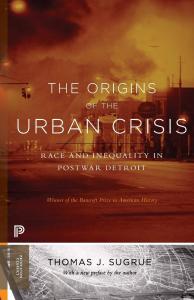 I first learned about systemic racial injustice in graduate school. In a course on twentieth-century U.S. history, we read Thomas Sugrue’s classic The Origins of the Urban Crisis: Race and Inequality in Postwar Detroit. Sugrue painstakingly and compellingly walks through the history of how we ended up with so many “inner cities” consisting of economically disadvantaged African Americans. The answer lay in the racist practices of the past, which created patterns that continued to affect future generations. Specifically, Sugrue recounts how after World War II Black Americans were not granted access to the same housing loans as White Americans, would not be sold houses in White neighborhoods, and were regularly the victims of property destruction and death threats when they managed to do so. Furthermore, conscious and unconscious hiring discrimination (the latter consisting of things like hiring primarily through referrals from existing employees who only knew other White people) meant African Americans ended up with more menial and lower-paying jobs than their equally qualified White peers, which further reinforced housing disparity. As manufacturing jobs evaporated, these practices left African Americans congregated toward the city center where those jobs had been, new ones were not forthcoming, and schools were consequently underfunded. Their children therefore started out significantly disadvantaged.
I first learned about systemic racial injustice in graduate school. In a course on twentieth-century U.S. history, we read Thomas Sugrue’s classic The Origins of the Urban Crisis: Race and Inequality in Postwar Detroit. Sugrue painstakingly and compellingly walks through the history of how we ended up with so many “inner cities” consisting of economically disadvantaged African Americans. The answer lay in the racist practices of the past, which created patterns that continued to affect future generations. Specifically, Sugrue recounts how after World War II Black Americans were not granted access to the same housing loans as White Americans, would not be sold houses in White neighborhoods, and were regularly the victims of property destruction and death threats when they managed to do so. Furthermore, conscious and unconscious hiring discrimination (the latter consisting of things like hiring primarily through referrals from existing employees who only knew other White people) meant African Americans ended up with more menial and lower-paying jobs than their equally qualified White peers, which further reinforced housing disparity. As manufacturing jobs evaporated, these practices left African Americans congregated toward the city center where those jobs had been, new ones were not forthcoming, and schools were consequently underfunded. Their children therefore started out significantly disadvantaged.
Connecting to the protests of today, these disparities contribute to the patterns of poverty and negative assumptions about African Americans that feed into consciously or unconsciously different treatment at the hands of some police officers. And this systemic sin has other negative effects too: I know law enforcement families under incredible stress right now because justifiable anger at the failure of some police departments to police their own has led in some cases to unjustified anger at all law enforcement agents. Of course the original source of the racism that created all these problems can be traced straight back to the system of American racial slavery. History is still v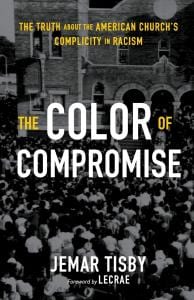 ery much with us.
ery much with us.
In his recent book The Color of Compromise: The Truth About the American Church’s Complicity in Racism, Jemar Tisby does something similar for the church, with respect to the long view of American history. He demonstrates how the White American church has consciously or unconsciously become complicit in upholding some of these structures of systemic racism by not pursuing the hard work of listening to, learning from, and sharing power with Black Christians.
So how can we respond in the face of seemingly intractable systemic sin?
(1) We can mask. Even if you doubt it helps, it doesn’t hurt you, and some wise people believe it helps others. Let’s all have the humility and graciousness to mildly inconvenience ourselves for the possibility of serving our neighbors.
(2) We can read. I have three books in my queue explaining why racial inequality remains rooted in our nation, and how the church can participate in fighting these entrenched sinful patterns. Any one of them would be a good starting point for educating ourselves on how to help: Jemar Tisby’s aforementioned The Color of Compromise, Latasha Morrison’s Be The Bridge: Pursuing God’s Heart for Racial Reconciliation, and Ken Wytsma’s The Myth of Equality: Uncovering the Roots of Injustice and Privilege.
3) We can pray. A friend recently preached on Jesus’s words, “The harvest is plentiful but the workers are few. Ask the Lord of the harvest, therefore, to send out workers into his harvest field.” The Lord wants to win over people’s hearts, to care for them physically, and to bring justice. May God do so, and may it begin with me.



